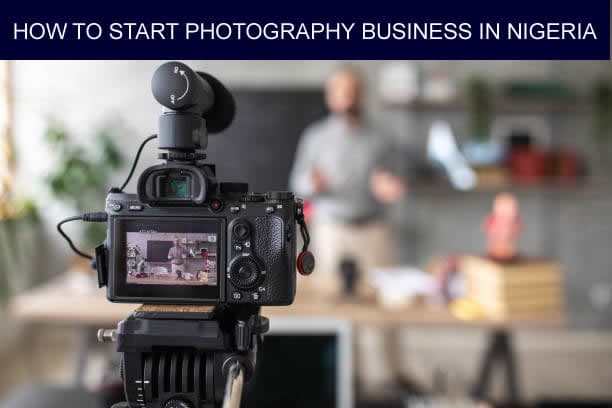The photography business is still in vogue because the saying “a picture is worth a thousand words” holds and will continue to hold. Photographs hold memories.
You can look at your pictures a few years after you took them and relish the memories in your mind.
Thanks to the advent of smartphones, anyone can take pictures anywhere using their phones.
However, you can still differentiate between a picture taken with a smartphone and that taken by a professional photographer.
The difference in quality is evident. This is why many people still expend money in taking photoshoots.
The photography business is lucrative and its demand keeps increasing by the day.
In addition, the photography business is a mobile business you can start from the comfort of your home. As the business grows, you can set up your own studio.
If you are always fascinated with special images and wish you could replicate them, photography business might be the best bet for you.
In Nigeria, you will hardly find a weekend free of events, especially in the cities like Lagos, Abuja and other part of the country.
As an aspiring photographer, this is one of the markets you can explore. With little training, you can easily gain photography expertise.

The more you grow in the business, the better your images will become.
Equipment Needed To Start Photography Business
There are some equipment you need to start photography business. You can get them one after the other as you progress in your business.
The list below should guide you:
A good camera
Camera bag
Tripod
Lighting
Backdrops
Lenses
Props
Editing software
Desktop computer/laptop
External hard drive
Photo printer
How To Start Photography Business
Step One: Choose The Niche That Inspires You
Determine the type of photography that catches your fancy.
Do you like portraits or you prefer documentaries; abstract imagery, or landscapes? The first step to the success of your photography business is to take your time to choose your niche.
Photography is not only about shooting with cameras, but it also requires a good dose of inspiration.
Once you find your inspiration, stick with it because that’s what will keep you going in the business.
A good way to find your inspiration is by sampling your interests.
If you love attending events, you could start with event photography. And, you can equally begin with nature photography if you are a lover of nature.
Step Two: Draft A Business Plan
Any business that wants to succeed must first develop a workable business plan.
A business plan is a detailed document containing the objective of your photography business and the strategy you intend to employ to achieve them.
Actually, the success or failure of your business can be predicted just by reading your business plan.
Basically, your business plan should contain the following:
An overview of your photocopy business
Executive summary
General company description
SWOT analysis
Market research
Your strategy
The team
A marketing plan
An operational plan
Financial projection
An appendix
To get a good camera, light, and other photography equipment, you will need a huge amount of money.
Hence, a detailed business plan can help you secure funding from investors, venture capitalists, or funding opportunities that show up.
Step Three: Register Your Business With CAC
Corporate Affairs Commission (CAC) is the recognized body in charge of business registrations in Nigeria.
It is advisable to start your business on a structured level because the advantages far outweigh the disadvantages.
One of the benefits of registering your business with CAC is that you can open a corporate account with your registration certificate.
Customers feel safer to pay into a corporate account than a personal account.
You can either register a business name or a limited liability company.
The business name is the best choice for sole proprietors just starting out. The tax implication is low and you can upgrade to a limited liability company as your business grows.
To begin, visit CAC’s portal to search for the availability of your chosen business name.
This is important because it will save you from building on someone else’s name.
After your business name gets approved, you can then begin the registration process.
Many aspiring business owners get stuck in the process of registering their business. So, it’s advisable to hire a legal practitioner to help you with the registration.
Once your certificate is ready, they will deliver it to you at your chosen location.
Step Four: Get A Good Camera
Once you’ve decided on the type of photography you want to start, the next step is to invest in a good camera. This is about the major equipment you need to begin a photography business.
A few years ago, there was a huge gap between compact point-and-shoot cameras and more professional DSLR cameras in terms of image capability and price.
But today, an aspiring photographer can easily get budget-friendly mid-pro mirrorless cameras that can take great pictures.
Once you get your camera, master how to use it.
Spend time to understand the functions and features of your camera. Learn about Aperture, Shutterspeed, and ISO among others.
Furthermore, you can hire a camera for your business if you cannot afford one immediately.
Here is a list of common camera modes you will find:
Auto mode
Macro mode
Portrait mode
Landscape mode
Sports mode
Aperture priority mode
TV mode
Night portrait mode
Manual mode
Step Five: Learn Photography Skills
Starting photography is not just about purchasing a camera. There are other salient skillsets to learn before you can be considered a professional photographer.
So, enroll in a photography academy, workshop, or tutorial.
With training, you will learn all you need to succeed in the business; from setting the camera to framing rules and photo editing.
Training will save you from the guessing game and costly mistakes you may make.
There’s no height you want to reach in your photography business that someone else hasn’t already attained. Hence, find someone that will inspire and pour their skills into you.
You don’t necessarily need to enroll in an academy to learn about the photography business.
Find a friend, colleague, or someone you know who is a professional in the photography business and learn from them.
You can tag along with the person when they have a shoot, check out how they make use of the camera, their pricing, editing style, and many more.
A very imperative part of photography you must learn is lighting.
This single factor can make or mar your business. A good photographer must learn about indoor and outdoor lighting.
If you are just starting out and you don’t have access to studio lights and slave flashes, you will be at an advantage if you can read the direction of light and manipulate it using props such as DIY light filters and reflectors.
This will help you to manually create highlights, shadows, and silhouettes within a scene.
Step Six: Learn Composure
In the photography business, the number of pictures you take is not what draws prospective clients to you. Actually, people go for a photographer with the best picture quality.
Therefore, before taking your shots, study your scene and the subject you are about to take.
By doing this, you will build concepts in your head and take your shots from the best angle.
Composure is a skill you have to continuously practice before you can gain mastery of it.
Step Seven: Practice
You cannot become a pro in a day, because growth and mastery in any business take time.
Once you’ve been able to wrap your head around the photography business, start taking photographs and show it to professionals to review them for you.
By doing this, you will learn what you are doing wrong and areas of improvement. Importantly, don’t rush your progress and don’t also compare your progress with those that have been in the game way before you.
Trust your unique process and learn at your own pace.
Step Eight: Get A Studio Space For Your Photography Business
You can decide to start your photography business by taking outdoor shots only.
But you can take it a step further by renting space to set up a studio for customers that will love to take photoshoots or travel to you for photos.
Step Nine: Promote Your Photography Business
This is where the whole job lies. No matter how good or professional you are, nobody will patronise you if your marketing strategy is poor.
You can start by distributing flyers and connecting to professionals who can recommend you if such an opportunity arises.
Here are other tips that will help you promote your photography business:
1. Volunteer For Shooting A Local Event
If you are starting out, nobody knows about your skills and how good your photography skills are.
The best way to showcase your skills to people is by offering freebies.
Approach event planners to shoot at their events for free. Interestingly, some people will still offer to pay you a stipend even when you volunteer.
At the beginning of your photography business, your focus should not be on money because once you acquire your customers, they will definitely pay for your services.
So, if you have anyone you would love to work with, the best way to get them to look your way is to offer freebies to them.
That will create a lasting impression on them and you can take the business relationship further from there.
2. Create A Unique Style For Your Photography Business
Obviously, there are several photographers who are good at what they do. Therefore, you need to have a style that will make you unique.
For example, you can devise a better customer service style than your competitors.
Anyone can copy your business idea but no one can replicate your customer service.
In simple terms, find out what your competitors are not doing and offer it to your clients.
Another way to be unique in your photography business is to have a creative logo that speaks volumes about your expertise.
It will surprise you that a prospective customer may decide not to work with you because they won’t like your bad logo to appear on their pictures.
Therefore, ensure your branding is appealing enough to your prospective customers.
3. Attend Events And Network
Be deliberate about attending events that will help you meet your prospective customers one on one.
When attending such events, don’t forget to go with your business cards and brochures containing your past jobs.
4. Referral
In photography business, it is easy to get referrals from a satisfied customer.
All you need to do is build good customer relationship with your existing customers and encourage them to refer you to their friends, colleagues and families.
5. Have A Website For Your Photography Business
Your website should serve as one of the online portals where you post all your jobs.
By just visiting your website, prospective clients should be mesmerized by your work and contact you.
Get a professional web developer to create a user- friendly website for you if you cannot create one by yourself.
6. Use Social Media To Your Advantage
Another potent way to push your photography business is to have a strong social media presence.
Over 80% of your prospective customers have at least one social media account.
Hence, open an account on the various social media platforms (Facebook, Instagram, Twitter, Pinterest, Tumblr, etc). In addition, run targetted ads on various platforms.
7. Sell Your Images Online
There’re so many outlets online where photographers can sell their images.
Many people are in need of pictures to use for their branding and artworks and you’ll discover some of the images on Google have copyright.
To use them, you need to pay. Hence, you can sell your pictures on your website, Adobe Stock, Shutterstock, Alamy, Etsy, Fotomoto, Crestock, 500px, etc.
CONCLUSION
Getting started is perhaps the most complicated part of owning your own digital photography business. First, you must decide what your niche is going to be.
Will you have a studio or will you freelance? Will you market yourself to the public, or focus on selling to publications or stock companies? Will you specialize in people, landscape or objects?
You can’t relax even after your business is up and running; building and maintaining relationships with clients and corporate purchasers is key to being a successful photographer.
Networking with other photographers is a great way to gain client referrals, learn trade secrets, or even find a mentor to guide you in your early years.






